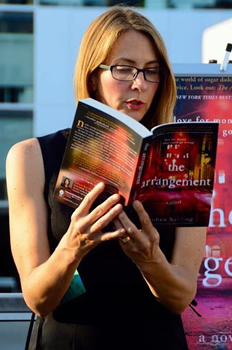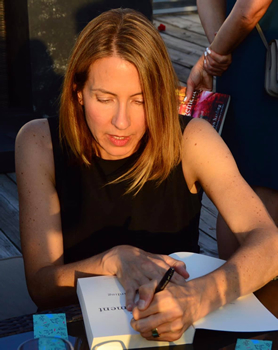

Up Close: Robyn Harding
Pushing Perfection to the Edge
We all know a family like them—wealthy, successful, beautiful. Perfect. At least, that’s the façade they present to the world, often online, where social media platforms can mask what’s truly going on behind that Facebook status update or cute Instagram collage.
But what happens when that perfect family is pushed to the edge, and that façade begins to unravel, exposing secrets and lies that could tear them apart?
That’s the premise behind international bestselling author Robyn Harding’s latest thriller, THE PERFECT FAMILY. The story follows the Adlers, the successful, attractive family who are envied by their neighbors—until one morning, when they wake up to find their beautiful porch has been pelted with eggs. It seems like a teenage prank, but it’s anything but funny when the egging is followed up by a smoke bomb that punctures the tires on their family car.
Of course surveillance footage tells them nothing, and the police aren’t interested in such petty crime—just some bored teenagers, they say.
But the pranksters are just getting started, and with each escalating incident, the Adlers exchange worry for fear. Because of course, behind that perfect façade, each of them has been hiding a secret—a secret with dangerous consequences.
THE PERFECT FAMILY is a propulsive page-turner that comes hot on the heels of last year’s provocative novel of suspense, The Arrangement. In this interview with The Big Thrill, one of the genre’s best shares insight into what inspired THE PERFECT FAMILY, the role social media has played in creating unrealistic expectations, and how she crafts those spellbinding twists.
The beginning of THE PERFECT FAMILY hit a bit too close to home—when I was a teenager, I upset one of the “mean” girls, and she and some friends first egged our house. The next week, the trees were toilet papered. And then, a rock through my bedroom window. It was traumatizing! Was there a personal experience that inspired this story?
I’m so sorry that happened to you! We had a similar experience, though it never escalated that far. We used to live across from a park where a lot of kids hung out late at night. They started knocking on our door and running away. Then they threw eggs, fruit, a firecracker… It was scary and unsettling. The oddest part was that we never found out why they were targeting us. That made me think about a family with secrets—secrets that they were keeping from the outside world and from each other—that could be causing these frightening attacks.
I think a lot about how social media has given us the ability to “project” a perfect family, when often, behind the Facebook curtain, there’s a tremendous amount of dysfunction and heartbreak going on. What role do you think social media has played in creating expectations—perfect family, perfect life, etc.?
President Theodore Roosevelt said, “Comparison is the thief of joy,” and social media has created a world of constant comparison. This relentless sharing of information and experiences creates pressure to present your life in a certain way, even when it’s not real. It elicits feelings of jealousy, inadequacy, obsession, and worse! Of course, social media has good aspects. As a writer, it’s a great marketing tool and a wonderful way to connect with readers. But overall, I think it has done more harm than good.
The Adlers are a fascinating family. I’d love to hear a bit more about how they developed for you.
Before I begin writing a novel, I create profiles for all my characters. Some of the details don’t make it into the book, but it helps them become real for me and informs the way they react to their circumstances. The characters in this book are all profoundly troubled, and I wanted to find unique ways to manifest that in their lives, through habits, compulsions, and just plain terrible judgment. And there is always a tiny kernel of myself, or someone I know, in each character I write. They are one hundred percent fictional, but there is a real quality in them that I attach to.
Not long ago, there was a fairly in-depth (and somewhat heated) Twitter discussion about how most domestic suspense novels involve wealthy people. What do you think is our fascination with this segment of society—and why do they make the perfect characters for thrillers?
I missed this Twitter debate, but I’m not surprised to hear that it happened. I was just reading a novel where every character had an Ivy League education, a family fortune, and a high-powered career. I thought: Wow, these people are ridiculously privileged. But it didn’t ruin the read for me. In fact, it made me eager to watch them fall. So I think there is an element of schadenfreude at play. We like to see those who have it all topple off their perches. It’s the same reason we love celebrity scandals.
THE PERFECT FAMILY is deftly told from four different POVs. Was there one that was easier to write? Which was the most challenging?
For me, women are always the easiest to write. In this case, the troubled mother, Viv, came quite naturally, followed by the angsty teen daughter, Tarryn. When I write female characters, I have my own experiences to draw on. The most challenging for me was Thomas, the husband and father in the family. But I also had a lot of fun with his male bluster and bravado.
What aspects of screenwriting, if any, carry over to your novel writing, and vice versa?
Screenwriting structure has been invaluable to my thriller writing! I used to write humorous fiction and I’d just wing it. But with crime fiction, I believe that plotting and twists are crucial. Employing the basic plot points of a screenplay is a great way to ensure your thriller pacing is on track. I haven’t written a screenplay for a few years, but I know that all the character work I do in my novels would be a huge asset.
You’re such a master of twists and turns. The Big Thrill is as much for aspiring writers as it is for readers. What advice would you give to writers about crafting the kinds of twists that could give a person whiplash?
Thank you! I often begin a novel with a “culprit” in mind and then, when I reach the third act, I change it. This doesn’t always work, but when it does, it can be a great way to throw readers off track. Of course, I have to go back and pepper in clues and make sure there are no inconsistencies, but when a writer builds a story pointing readers in one direction, they will follow.
What can you share about what you’re working on next?
I’m writing a novel about a woman who lost her restaurant during the pandemic and is left homeless. She’s sleeping in her car, parked near a secluded beach, when she intercepts a wealthy woman attempting to drown herself. An unlikely friendship develops between them. But is it real? And can the drowning woman be trusted?
- On the Cover: Alisa Lynn Valdés - March 31, 2023
- On the Cover: Melissa Cassera - March 31, 2023
- Behind the Scenes: From Book to Netflix - March 31, 2023




